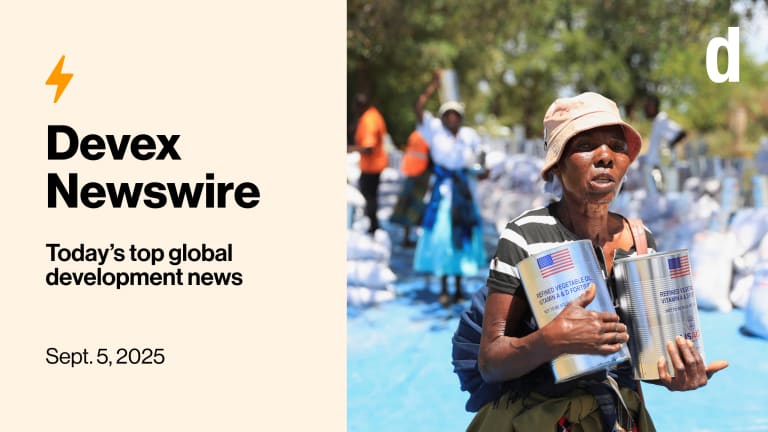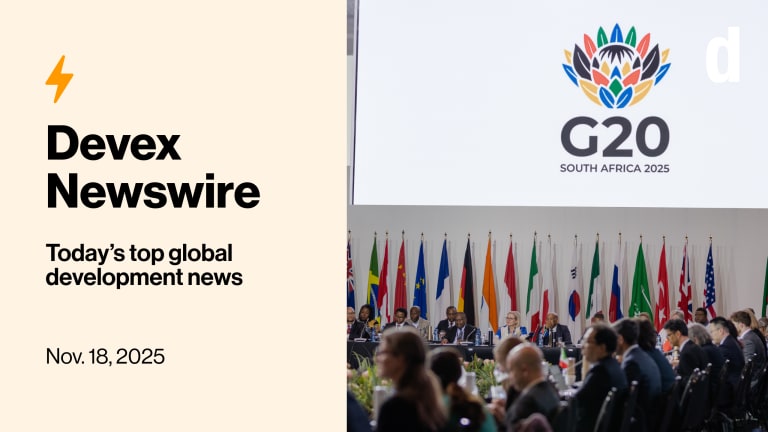
Today we’re looking back at the World Health Assembly … and what it didn’t get done.
This is a preview of Newswire
Sign up to this newsletter for an inside look at the biggest stories in global development, in your inbox daily.
Now that the dust of WHA has settled, we can take a clearer view of its missed opportunities. Here’s a rundown of what could have been done that instead got forgotten or kicked down the road.
• Adopting a fully formed pandemic treaty at WHA was a long shot. But the group could have endorsed a resolution supporting one or formed a task force to draft language. Instead, we got a working group to analyze the pros and cons, and a promise of more discussion in November.
• A lot of WHA speakers brought up inequality in vaccine access. But at the end of the day, said Women in Global Health co-founder Dr. Roopa Dhatt, the summit’s “biggest weakness [was] not agreeing [on] a strategy for vaccinating the world.”
• Now all eyes are on the G-7 summit scheduled for June 11-13, where global health advocates hope some of these loose threads can be picked up. In an op-ed published Tuesday, leaders of global institutions called for a “new level of international support for — and implementation of — a stepped-up coordinated strategy, backed by new financing, to vaccinate the world,” specifically targeting the G-7 summit as a new opportunity.
Read: 74th WHA: Historic or business as usual? Experts weigh in
Slow lane
The work revolution everyone’s been talking about is that they never want to go back to the office. But a different change has been quietly brewing: The four-day workweek movement, which proponents (and some pilot programs) say improves productivity, is better for the environment and helps employees stay sane.
After a lengthy trial and evaluation, British NGO STOPAIDS adopted a 28-hour working week — four days of seven hours each — and found “no negative impacts,” according to consultant Mona Chergui. While it’s not yet catching on widely in the sector, advocates see it as not just a way to retain workers and avoid burnout, but to attract a more diverse employee pool.
Devex Pro: The NGO working a 28-hour week
Nervous tech
“In desperate times, we take measures that are appropriate for those times.” — Steve Davis, senior China strategy adviser and interim director for the China country office at the Gates Foundation
At a Devex Pro Live event yesterday, Davis declined to speak on behalf of the foundation about support for a COVID-19 vaccine IP waiver — but said that either way, a waiver is just the first step.
Trouble spots
Yesterday, the U.K. reported zero daily deaths from COVID-19 for the first time since March 2020, and 43% of Germans have received at least their first vaccine shot. But in South America it’s a different story. Mortality has increased in Paraguay and Bolivia by over 20% in the last week, the World Health Organization said Tuesday. And the share of positive tests remains dramatic:

Colombian Vice President Marta Lucía Ramírez was in Washington Friday to meet with U.S. Secretary of State Antony Blinken and urge the U.S. to send some of the 80 million doses it’s promised to share with other countries to stem Colombia’s crisis. Many of the vaccines her country has already ordered now aren’t expected until December, Axios reports.
Paying tribute
Negasi Kidane, from Tigray but working for Italian NGO CISP, was killed by a “stray bullet” — it’s not clear whose — when caught in a battle over the weekend. He’s thought to be the ninth aid worker killed in the region in seven months.
In other news
The U.S. Department of Justice has seized two domains that were used to hack into the USAID email system. [Reuters]
Beijing-based AIIB remains open to funding projects in Myanmar, amid increasing international pressure to cut ties with the military junta. [Financial Times]
WFP needs more than $200 million to help 5.2 million people in the Tigray, as hunger levels soar due to instability in the region. [Al Jazeera]








